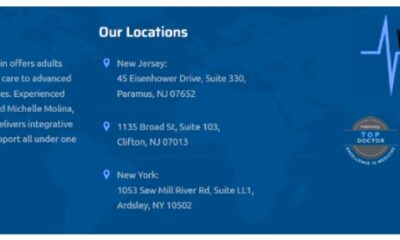Health
Melchert Eye Care: What Your Eye Doctor Wishes You Knew About Contact Lens Hygiene

Wearing contact lenses offers a convenient alternative to glasses, but it requires a commitment to healthy habits and proper hygiene. Many are unaware of the risks that come with neglecting care routines, and small oversights can lead to undesirable consequences. From infections that threaten vision to everyday discomfort, Melchert Eye Care stresses that the effects of poor lens hygiene shouldn’t be underestimated.
Understanding common mistakes, recognizing warning signs, and following professional advice can greatly reduce the chances of complications. Whether you’re new to contact lenses or have worn them for years, refreshing your knowledge and paying attention to your habits can keep your eyes safer and your vision clearer. Simple daily actions, paired with guidance from your eye doctor, are often all it takes to avoid unnecessary problems.
The Importance of Contact Lens Hygiene
Contact lenses sit directly on the surface of your eye, making proper hygiene essential for preventing complications. When lenses aren’t cleaned or stored correctly, bacteria and other microorganisms can quickly multiply, leading to infections like keratitis or conjunctivitis. These can cause discomfort and, in serious cases, lasting damage to your vision.
Poor contact lens hygiene can also lead to more serious eye infections that may result in corneal abrasions—scratches on the clear front surface of the eye. These abrasions can be extremely painful and may cause permanent scarring if not treated promptly. Bacterial, viral, or fungal infections from contaminated lenses can also penetrate deeper into the eye tissue, potentially threatening vision if left untreated.
Many eye issues tied to contact lens use are avoidable with the right care. A person who reuses old solutions or stores lenses in tap water unknowingly raises their risk of eye irritation or more severe problems. Even minor lapses can lead to symptoms that interfere with daily life, such as dryness or a gritty sensation in the eyes.
Common Mistakes People Make
A surprising number of contact lens wearers develop habits that can harm their eyes. Sleeping in lenses not designed for overnight wear is one of the most frequent missteps. When the eye doesn’t get enough oxygen during sleep, it becomes more susceptible to infections and irritation. Some people assume it’s harmless after doing it once or twice, but the risks stack up with repetition and can lead to long-term issues such as corneal ulcers.
Another overlooked mistake is using tap water or saliva to rinse lenses. Though it might seem harmless in the moment, both can introduce harmful microorganisms to the eye. Even topping off old solutions instead of replacing them entirely can reduce the effectiveness of disinfection and increase the risk of contamination.
Neglecting to wash hands thoroughly before handling lenses is also a common oversight. Oils, dirt, and bacteria from your fingers can easily transfer to the lens and then to your eye. What seems like a shortcut can have long-term consequences.
What Eye Doctors Want You to Do
Eye care professionals emphasize consistency and caution when it comes to lens hygiene. Washing and drying hands before touching lenses is a basic step that many people rush or skip, but it remains one of the most important. Clean hands reduce the risk of transferring bacteria or debris to the lens surface. This simple step often makes the difference between a clear vision and chronic irritation.
Replacing lenses and cases on schedule is another key point. Overwearing lenses or keeping the same case for months can create a breeding ground for bacteria. Even if the lenses feel fine, the buildup of deposits and contamination may already be affecting eye health.
Using only approved contact lens solutions and avoiding reusing or mixing old solutions can drastically reduce the chance of infection. Your eye doctor recommends these steps for a reason—they’ve seen firsthand what can go wrong when hygiene is treated casually.
Signs Something’s Wrong
Discomfort, persistent redness, or blurred vision after wearing contact lenses shouldn’t be brushed off. These symptoms may signal that something isn’t right, such as a developing infection or allergic reaction. Even a slight change in how your eyes feel can be the body’s warning system trying to alert you. Sudden sensitivity to light or excessive tearing may also indicate an underlying issue.
Some people continue wearing their contacts despite irritation, hoping the issue resolves itself. This decision can prolong damage and increase the risk of complications. Removing your lenses at the first sign of trouble and allowing your eyes to rest is often the safest move. If symptoms persist, it’s important to seek advice sooner rather than later.
Practical Habits That Help
Small, consistent habits can make lens care easier to maintain. Setting a phone reminder to change your lens case or replace your lenses on schedule helps ensure you don’t forget. These habits can quickly become second nature with just a little effort. Keeping your supplies organized in one spot can also streamline your daily routine.
Life doesn’t always go as planned, which is why carrying a spare pair of glasses is useful. Whether you’re traveling, working late, or simply dealing with dry eyes, having a backup gives your eyes a break without disrupting your day. These little habits not only support eye health but also make contact lens use more flexible and worry-free. Staying prepared can help you avoid unnecessary strain on your eyes.
Making the Most of Your Eye Doctor Visits
Many people see their eye doctor as someone who only updates prescriptions, but those appointments are valuable opportunities to fine-tune lens care. Asking questions about your current routine can uncover small adjustments that make a big difference in comfort or safety. Even brief conversations can reveal better-fitting lenses or more suitable cleaning methods.
Your provider can also introduce you to new options—whether it’s a better solution for sensitive eyes or a different lens material that suits your lifestyle. Staying engaged during these visits helps ensure your contact lens experience remains safe and comfortable.
-

 Education4 weeks ago
Education4 weeks agoBelfast AI Training Provider Future Business Academy Reaches Milestone of 1,000 Businesses Trained
-

 Sports3 weeks ago
Sports3 weeks agoUnited Cup 2026: Full Schedule, Fixtures, Format, Key Players, Groups, Teams, Where and How to Watch Live
-

 Book3 weeks ago
Book3 weeks agoAuthor, Fighter, Builder: How Alan Santana Uses His Life Story to Empower the Next Generation Through UNPROTECTED
-

 Health3 weeks ago
Health3 weeks agoNew Research and Treatments in Motor Neurone Disease
-

 Science3 weeks ago
Science3 weeks agoJanuary Full Moon 2026: Everything You Should Need to Know, When and Where to See Wolf Supermoon
-

 Entertainment3 weeks ago
Entertainment3 weeks agoTigerteeh aka Touseef Panchbhaya Drops His Latest Hindi Track “Toxic”
-

 Startup2 weeks ago
Startup2 weeks agoCraig Bonn’s Guide for Spotting a Winning Pre-IPO Early
-

 Lifestyle3 weeks ago
Lifestyle3 weeks agoKent Strunk: The Lifelong Twins Fans Building Family Traditions One Game at a Time














